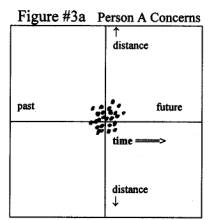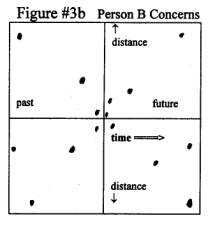|
from The Worldview Literacy Book copyright 2009 back to worldview theme #3 |
|
Discussion Imagine
two idealized people: person A, with worldview and associated behavior
dominated by worldview theme #3: "Focused Vision," and person
B, who similarly holds the diametrically opposite theme #4:
"The Big Picture: Global Vision."
Consider three differences between these people.
The first two differences are contrasted using a space vs. time
plot to characterize worldviews. This
is a graph in which distance from the current location is plotted
vertically, and time elapsed since the present moment is plotted
horizontally (with points to the right in the future, points to the left
in the past). Imagine that
we can locate the thoughts and concerns in each individual’s mind in
this plot—plotting one point for each of them. Looking at our finished
products (Figures #3a, b), we note person A's points cluster around the
center or origin of the graph. In
contrast, person B's points typically extend out from the origin much
farther in all directions. Why?
Person A spends more time mentally living and operating in the
present, whereas person B's thoughts more frequently take him or her
back into the past or forward into the future.
So most basically, Person A's worldview is 1) more here and now
centered and 2) takes in a smaller space-time field of view than Person
B's.
We can imagine a third difference in vision: in
"resolution." Perhaps person A pays more attention to small
detail, while person B sees overall patterns better.
In the metaphorical forest, the former appreciates the trees, the
latter the forest. This
could carry over to how they classify information: person A being more
of a "splitter," person B more of a "lumper."
Splitters focus on the differences in collections of things they
encounter, whereas lumpers look for similarities.
Splitters tend to be more analytical and reductionistic.
When working with organized wholes possessing a hierarchical
multi-level structure, conceivably person A tends to move from higher to
lower levels of organization, person B in reverse fashion. (Note: presence of this third difference is less characteristic of
those with "Focused Vision" than the first two!)
The preceding discussion characterizes "Focused Vision"
in a space and time context. After
reading the corresponding discussion for "Global Vision" (see
Discussion, theme #4) you'll better appreciate the contrast between
these two themes in that context. With
their smaller field of view, what do those with "Focused
Vision" typically tend to concentrate on?
One general answer is themselves.
They often are egocentric, with
a self-centered viewpoint that narrowly limits the outlook to focus on
their feelings, needs, concerns, problems, and activi-ties.
Some are more introverted than extroverted.
Now, put yourself into the shoes of someone who possesses
"Focused Vision." What
would it be like to be this person?
First of all, you are self-centered to the extent where such
empathizing is difficult! You
best do it with members of your |
Discussion—continued immediate family.
That point made, consider how you typically spend your time.
After dealing with your own personal problems, which often
involve emotional needs and psychological issues, you attend to the
daily challenges posed by home, job, and family problems.
You are typically very busy!
To best cope, you become goal-driven and task oriented. You set
short-term goals and identify steps needed to attain them.
You narrowly focus
attention and energy on completing particular tasks by concentrating on
their immediate cognitive and mechanical aspects.
You've become efficient at solving problems a certain way:
confronting their basic aspects, strip-ping away the rest, and avoiding
getting sidetracked by how these problems connect to the wider
world—one that could involve the past, future, more people, greater
geographical area, and emotional, aesthetic, ethical, and philosophical
concerns.
You try to efficiently use your time and in a narrow sense you
sometimes succeed. But
alas, your frequent failure to step back and see what's really important
means you often waste time: nit-picking, solving little problems,
seeking perfection when less would suffice, micro-managing when you
should be delegating, or with seemingly big problems you get obsessed
with! You don't recognize
the really big problems when they potentially lurk out there in the
future. Then they are
smaller, more tractable. But
when they finally appear on your screen they loom large!
Then, rather than having time to analyze and select the best plan
from alternative ways of tackling them, you have few or no alternatives
and little time. If you'd
only been able to change your perspective and had seen them coming! And something else: in the future, you need to better apply
lessons learned from past mistakes!
The above characterization is set in the real world of daily
crises, where "the squeaky wheel gets the grease!" While it depicts someone who succeeds in a narrow sense, it
communicates a sense of pettiness, of anxiety-driven pre-occupation with
problems. This makes it rather unattractive.
Consider instead a person who embraces only the start of this
theme: "I am focused on the here and
now." Leaving the past
behind can be liberating! As
Eckart Tolle puts it, "I have little use for the past and rarely
think about it." Before
learning to appreciate The Power of Now (the title of his 1999
book), he "lived in a state of almost continual anxiety."
Meditation, yoga and related techniques are routes many take to
"live in the moment."
"Focused Vision" is but one worldview theme. Before
one's overall worldview can be described as narrow, the rest of what it
is built on most be considered. Of
the eighty such possible worldview theme choices, some are narrower than
others (see Figure #3c). Those
who exhibit "Focused Vision" are more likely to hold
worldviews incorporating these choices than are those whose outlook is
not so limited in space and time. |
|
Figure
#3d Focused
vs Global Vision Two
Metaphors 1)
The Lens you View the World Through.
Those
with Focused Vision use one with a much narrower field of view. |

